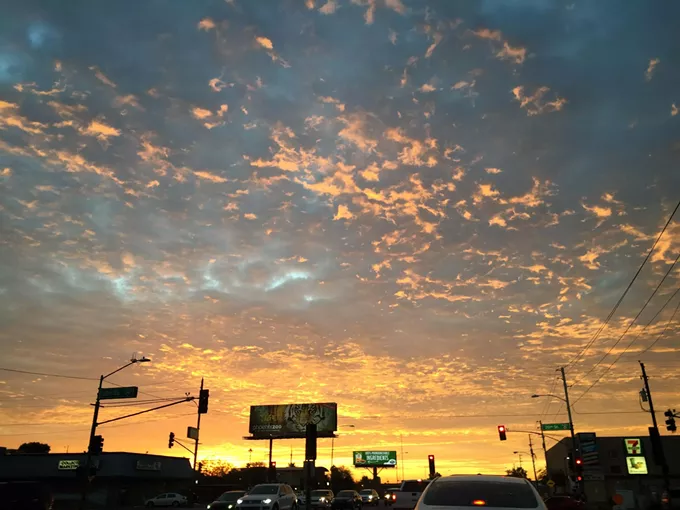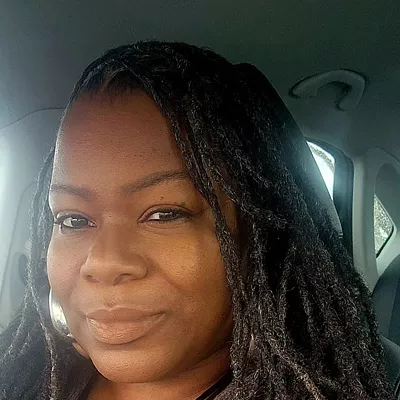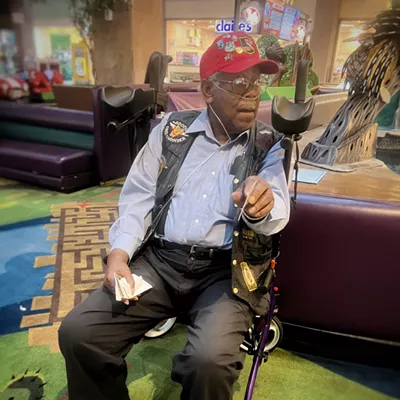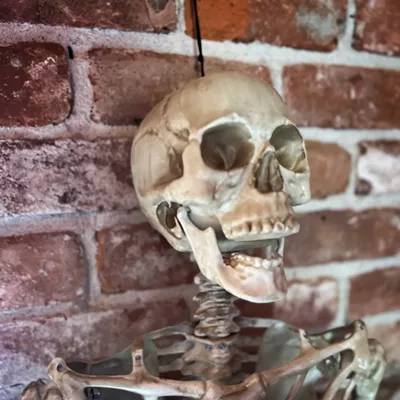Brake lights form red ellipsis to his spot on the dusty brick, between a concrete curb and a traffic-light pole. Twilight is coming down fast.
I see him on the corner and I swear I know him but he is hard to recognize. Yes, it is Will, alone as always, a guy in his 30s I’d befriended for a few days. I wrote about in this space, a year or so ago. I’d seen him a couple times on the street after the story ran, he’d said he was thankful somebody gave a shit, but his descent was clear and sad. That was months ago. Will was a blooming fentanyl casualty then, and apparently more so now; complexion darker, flaking, his natty thrift-store élan replaced with tatty ill-fittings, his noir-film-star cheekbones now severe, shelved higher, like he is forever sucking in his cheeks.
He imagined then of one solid place where he might lay his head permanently. This evening he keeps his head down as he stands there, as if to avoid faces of drivers motoring past, or maybe listening to the two kids shouting at each other on bikes out past the 99 Cents and Silk Flower Store on Pima Street. I remember he loved to pick up conversations of passersby and compose stories from such in his head. The schooled guitarist, whose guitar is long gone, had figured hard on ways to fill time alone on streets. He is a gentle-mannered guy who could see beauty in the ugly and he appeared then to me tougher than pain. He inspired in ways.
Will was full of some semblance of hope for self-rule. His intelligence, which offered no paycheck in this world, showed a well-read autodidact with a brain wired for critical thinking far removed from the scope of his shuttered corner in life. At that moment he was a street-scholar occultist, a well-read Aleister Crowley fan selling fetching and hangable folk-art crosses he fashioned with found wood, copper vacuum-cleaner wire and dumpster-dived art supplies, for fruit to quiet the upheaval in his belly and for dope. His were works in irony: not about Jesus; nah, crosses of wood meant as pre-Christianity amulets, to show the “spiritual and physical,” he told me.
No one watches him, sees him, much less knows of his kindness or acknowledges his very presence in the world. I can’t help but consider how life is receding from him in a much quicker clip than anyone I know. Is there a part of him that wants to be remembered at all?
We move past Will, through the light and I turn my car around, go back and pull over. I watch him for a few minutes, my two small daughters in the back seat asking why we stopped.
Music is playing from somewhere. No, not exactly music, it is more of a rhythmic racket, metal on metal, melody-free and toneless, but fashioned into a haunted, kind of low-frequency drone. It is a sound I know, so I’ll tell you, and you will hear it too if you listen. It is the sound of despair and it pulsates underneath everything. It is in the cities and the dust, the day and the night, beneath the eyes and the feet, the consciousness. It is the sheer scale of U.S.-backed child murders in Gaza. It is big banks and billionaires. It is vanishing wildlife. It is omnipresent and shameless hatred. It is the energy of the relentless information hammering us every minute. It is Will standing on the street corner.
Motionless, hunched over at the intersection, catching the last of the wide orange sunset light from across the tops of the Tucson Mountains, Will appears mythological, turned to stone, damned to a street crossing forever. Even his hair is solid in the breeze. He favors his right side and several crosses dangle from his fingertips extended toward traffic. A stillness drops over the momentum of the late-afternoon city and the music is louder. I want to shut the motor down, get out and pick up where we left off, but an unapproachable desperate air about him stops me. I recognize certain agony, and recall floods me with dread and anxious shivers—it is when you’re short the scratch for whatever escape, and the body and the mind is screaming for the one relief that no other necessity can mollify, not food, not water, not shelter. I want him to have some relief, and no one else but him knows what is good for him in that very moment. I have no coin to donate his way this evening and so I feel worse.
I point from the rolled down window of my car to my friend on the corner and tell my daughters I know that man, his name is Will. My daughter Rickie looks up from the Frozen starring Elsa coloring book in her lap, follows my point.
We study him a moment, and she says, “Oh! I remember him. Is he OK?”
“I think he’s as good as he can be today,” I say to her.
“He looks sad. Does he need his mama and a papa?”
It is not easy to hold back the wet in my eyes. Four-year-old Rickie says, “It’s OK, papa.”
I back out of there and head toward home, feeling selfish leaving Will behind but thanking every damn god I’d ever heard of.







